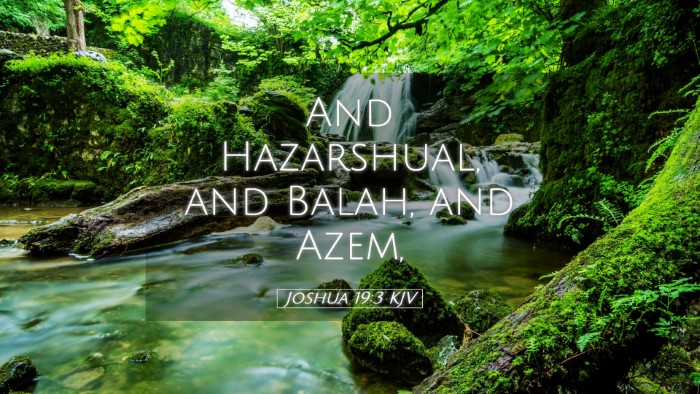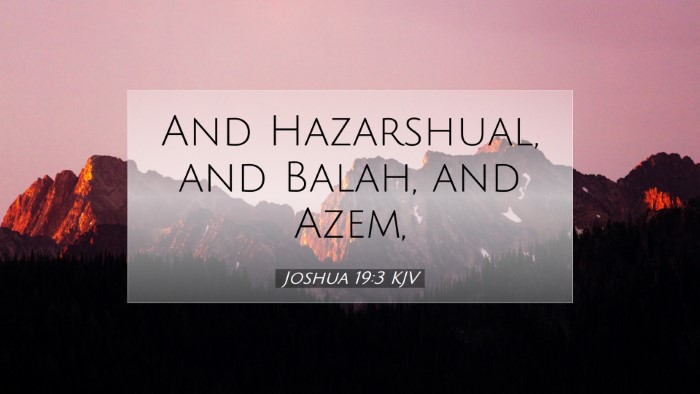Commentary on Joshua 19:3
The verse in question, Joshua 19:3, states:
"And Hazar, and Kadesh, and Edrei, and Ibeam, and Kadesh, and across this old kingdom."
This passage, like many in the book of Joshua, delineates the allocation of land amongst the tribes of Israel following their conquest of Canaan. In this commentary, we will synthesize insights from public domain commentaries, particularly those of Matthew Henry, Albert Barnes, and Adam Clarke, to provide a comprehensive examination of this verse.
Historical Context
The allocation of land as described in the book of Joshua is both a theological and historical narrative. The Israelites had wandered in the wilderness for forty years before entering Canaan, and this moment reflects the fulfillment of God's promises to their ancestors. It is significant that the land is being divided among the tribes as an affirmation of the Israelites' identity as God's chosen people.
The Significance of Hazar and Kadesh
In commenting on the cities mentioned in this verse, Albert Barnes identifies Hazar and Kadesh as locations of notable importance. Hazar, which means "enclosed," represents a place of safety and provision, likely indicative of God’s safeguarding of His people as they settle in their inheritance. Kadesh serves as a potent symbol of God’s mercy, as it was there the Israelites received new life after their wanderings.
Matthew Henry emphasizes that such cities were strategically located and served as cities of refuge, crucial for understanding the ancient Israelite understanding of justice and mercy in society.
The Concept of Inheritance
The idea of inheritance runs deeply throughout the narrative in Joshua. Adam Clarke remarked that the allocation of cities was not merely a distribution of land but rather a theological concept of divine promise coming to fruition. The land represents a tangible inheritance that reflects spiritual truths about God's faithfulness and the covenant relationships He establishes with His people.
This idea is emblematic of how God’s promises, while often delayed, come to fruition in His perfect timing. Clarke notes that the cities listed in this verse not only served a practical purpose but also reminded the Israelites of the faithfulness of God and the necessity of their devotion to Him in their new lives.
Lessons for Modern Believers
This verse, while historical, has profound implications for today's followers of Christ. Just as the Israelites received their inheritance, believers can look forward to their spiritual inheritance. Matthew Henry notes that the allocation of land invites modern Christians to reflect upon their own inheritance in the promise of eternal life through Jesus Christ.
- Faithfulness of God: Just as God was faithful to Israel, He is faithful to His promise today.
- Importance of Community: The cities serve as reminders of the community of faith; believers today are called to build one another up within the body of Christ.
- Divine Providence: This reflects the providential care of God in guiding His people, ensuring they have what they need.
Conclusion
In conclusion, Joshua 19:3 serves as a focal point for understanding the interplay of God's promises, the inheritance of land, and the communal identity of Israel. Through the insights of Henry, Barnes, and Clarke, we grasp not only the historical significance of these cities but also the spiritual truths they convey to believers today. The inclusion of specific locations such as Hazar and Kadesh emphasizes that God is intimately involved in the lives of His people, offering refuge, provision, and inheritance.


